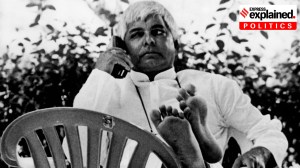As Foreign Ministers meet,Chinese scout for Indian tech talent
Six members of a Chinese Govt delegation are spending their work week in Bangalore,intensely wooing Indias software companies and talent to Chengdu,a city in western China.
India and China may eyeball each other along their contentious common border,but a contrasting story unfolded thousands of kilometres away in Bangalore even as External Affairs Minister S M Krishna and his Chinese counterpart Yang Jiechi met in the city on Tuesday to address irritants in ties.
Six members of a Chinese government delegation are spending their work week in this technology hub,intensely wooing Indias software companies and talent to Chengdu,a city in western China.
Seemingly oblivious to the fierce Twenty-first century rivalry,the Chinese officials said they were solely focused on business opportunities.
Indias outsourcing companies have done so well globally,we want them to set up in China and help grow our services sector, said Zhu Yunkai,a director of Chengdus Tianfu Software Park.
Tianfu,Chinas largest software park,is government-owned.
India and China,the worlds two most populous countries have the advantage of an abundance of low-cost talent. China outshines India in almost every sphere of commerce and has the biggest chunk of global business whether in textiles or toys.
But in the battle for the global software business,India holds a clear edge. China now wants to replicate the Indian model.
Even as the Chinese delegates participated in back-to-back business meetings,a few kilometres away in another of Bangalores luxury hotels the foreign ministers of India and China confabulated on touchy bilateral issues.
If these two big countries can work together,it will be the perfect 21st century partnership, said Christine Du,the deputy director of Chengdus Hi-tech Development Zone.
The average Chinese citizen does not care about politics,said Du. People want to live in a nice apartment,they want to drive a nice carthat is what the Chinese think about, she said.
Chengdu,the capital of Chinas Sichuan province,could potentially be very attractive to Indian companies. It is the countrys fifth most populous city.
Du said Chengdu,with 42 universities and 1.5 million engineers,offers low-cost,high-quality labour.
It would only be a four-hour journey from Bangalore once direct flights became operational,said Du. Our food is spicy,our winters are moderate and we have a variety of fruits and vegetables available through the year.
Despite the obvious attractions,to many Indian tech executives,the concerns were still political.
Would Indian technology companies be treated on par in China with Western multinationals,they wanted to know. Then,why are the Indian companies already set up in China growing so slowly?
The atmosphere is very fair, was Dus response. She described the Chinese government as running like a big company. They want companies whether Indian or Western to grow the economy and that is all they care about, she said.
It does seem that making a success of its software services sector is paramount to the Chinese government. Tianfu Software Park,for instance,has hired two foreign nationals for key functions that the Chinese lack a marketing head and an English teacher.
Tianfu wants to import other key ingredients such as top-level IT managers from India. Du said the delegation was screening local headhunters so they could hire middle and senior level managers for Chinese companies.
Meanwhile,with the influx of foreigners,Chengdu is ramping up its other resources. Tianfus European marketing head is tasked with the job of negotiating to bring in Starbucks and McDonalds so that foreigners would feel as comfortable in Chengdu as in Bangalore.



- 01
- 02
- 03
- 04
- 05




























